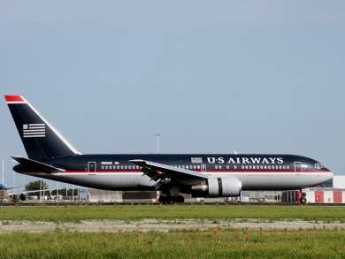Related Topics
Conventions and Convention Centers
When you have a big convention center, some circus is always coming to town. Philadelphia has always been a convention town, has had and still has lots of convention sites, and hopes to have more of the kind of famous convention we have had in the past.
Airport Economics

|
| US Airlines |
The Philadelphia Airport is flourishing at the moment. It seems a little noisy as a result of being only seven miles from the center of the city, but it's clean, not terribly expensive, and there are almost enough places to park. A short-term worry is an impending bankruptcy of US Airlines, its biggest tenant, although bankruptcy is recognized as about the only way keen managers can legally correct over-generous union contracts. Perhaps a longer-term worry is that we have no flights to Asia and South America so we will lag other American cities in business relationships with those prospering regions. To more than any other factor, the prosperity of airports can be attributed to their belated awakening to the scarcity value of landing slots. Philadelphia has added forty slots in the past year.
The decline is largely a reflection of the decline of a popular airline concept called Hub and Spokes, in which the airline deliberately breaks a long flight into two pieces, with a change-of-planes at the hub. The approach allows them to use smaller planes, reduces vacant seats, but doubles the number of landings per passenger trip. Passengers don't like to change planes, don't like the baggage mix-ups, don't like the longer flight times, don't like to miss their"connections". Well, as Commodore Vanderbilt said, the public is damned. But airlines better be careful about the airports, because they don't like Hub-and-spokes, either. In an effort to reduce the delays related to more frequent plane switching, the airlines' scheduled arrivals and departures in waves, usually around meal times with the advantage they also don't have to feed you. In their frenzied rush to catch the connecting flight, most passengers are unaware that the airport is dead empty for an hour or two between these waves of landings. Mathematical formulas even suggest it's inevitable, since a plane may not take off until the destination airport clears it, and therefore these waves at the hub are even mysteriously transmitted to less-busy "spoke" airports. The hub system thus provoked inefficient use of the commodity in shortest supply, namely the landing slots. One even suspects that the ripples extend out to state politics, since inland cities like Pittsburgh prosper as hubs, while seacoast "cities of passenger origination" like Philadelphia, suffer. To whatever degree this matter can be affected by regulation, it inevitably has a Harrisburg component, too.
Maybe we ought to get economists interested in devising a general economic principle at work here because a similar phenomenon is visible in at least one other industry. The next time someone tells you a relative has just been released from the hospital, surprise them with this question, "Did he go home on Saturday morning, I suppose?"
Originally published: Thursday, October 21, 1999; most-recently modified: Monday, May 13, 2019